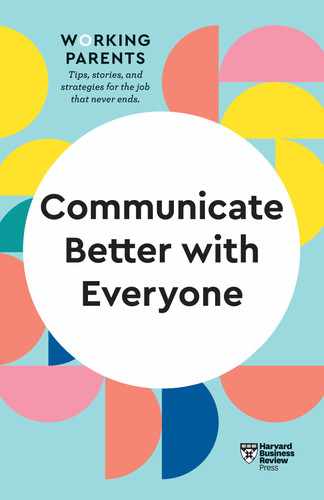A-BCDs (Avoid Blame, Contempt, Defensiveness, and Stonewalling), 59–60
Americans with Disabilities Act (ADA), 82. See also mental health issues
assumptions
challenging in self-talk, 132–133
clarifying, 27
in negotiating extended leave, 92
authority
setting boundaries and, 14, 20
balance
ongoing pursuit of, 9
belaboring the point, 34–36. See also listening
beliefs, challenging your, 132. See also self-talk
blame, 8, 47. See also A-BCDs avoiding, 59–60
bosses
communicating with about mental health issues, 81
managing employees with overactive inner critics, 144–145
negotiating extended leave with, 90–93
relationship management with during extended leaves, 94
renegotiating boundaries with, 5–6
boundaries
agreement on, 13
challenges to, 15
negotiating extended leave and, 92
personal crises and, 76
resetting after emergencies, 19–20
sharing confidences and, 42
career phases, discussing with your kids, 121–122
career triangle, 123
Carmichael, Sarah Green, 139–145
children
boundary negotiation with, 7–9
as boundary predators, 12
career conversations with, 119–125
mental health issues in, 85–86
modeling compassionate self-talk to, 137–138
choice, embedding, 107. See also negotiations
Coleman, John, 113, 114–115, 116–117
colleagues
negotiating extended leave with, 90–91
relationship management with during extended leaves, 93–94
renegotiating boundaries with, 5–6
communication skills, personal/professional intersection of, 151–154, xiv–xv
communication styles, listening and, 29–36
compassion, 77
competitiveness, listening and, 24, 114
confidence
conveying by listening, 24
your inner critic and, 145
confidences, being worthy of, 37–42. See also listening
confidentiality, honoring, 42
contempt, 59–60. See also A-BCDs
continuous improvement, 153–154
contradicting others, 49–50. See also difficult conversations
conversations
difficult. See difficult conversations
for renegotiating boundaries, 4–9
with yourself, 5
credentials, boundary setting and, 14
crises. See emergencies
critical thinking, 142–143. See also self-talk
criticism, 140–141. See also self-talk
decompressing, 116–117. See also stress
defensiveness, 59–60. See also A-BCDs
difficult conversations
A-BCDs for, 59
avoiding assumptions in, 57–58
convincing vs. learning in, 56–57
helping your partner cope with work stress, 111–117
making sure you’re heard in, 45–52
negotiating with your kids, 101–109
opposition vs. partnership in, 55–56
disagreements, saying “and” vs. “but” and, 49. See also difficult conversations
distractions, listening and, 26
Dowling, Daisy, xiii–xvii
emergencies
resetting boundaries after, 19–20
emotions
compassionate self-talk and, 131
difficult conversations and, 66, 67
fear, 140
modeling compassionate self-talk and, 137–138
negotiating with your kids and, 103
not apologizing for, 48
questions to find the source of, 32–33
self-talk and, 140
end-of-work habits, 117. See also stress
Equal Employment Opportunity Commission (EEOC), 82, 83
excuses, avoiding, 18. See also boundaries
expectations, clarifying, 75–77, 131
fairness, 108. See also negotiations
feedback
for kids’ career choices, 121
from our children, 154
friendships, 116. See also stress
frustration, finding the source of, 32. See also listening
goals
communicating to employers and colleagues, 5–6
identifying your, 5
in negotiating with your kids, 104–105
Gottman, John, 59
health care rights, 82. See also mental health issues
hobbies, 116. See also stress
hypotheticals, 49–50. See also difficult conversations
“I” language, 46. See also difficult conversations
interruptions, 113. See also listening
kindness, in self-talk, 131. See also self-talk
leave. See time off
listening
asking questions and, 23
communication style differences and, 29–36
misconceptions about, 22
to overexplanation/belaboring the point, 34–36
remembering details and, 40
repeating words back to the speaker and, 34, 35–36
to venting or screaming, 31–34
to your partner, 113
management skills and parenting, 149–154
mantras, mental health and, 84. See also self-talk
managing your return from, 82–85
preparing for leave due to, 80–82
prevalence of, 80
warning signs of, 85
modeling
taking responsibility, 58
vulnerability, 40
National Alliance on Mental Illness (NAMI), 86
negotiations. See also difficult conversations
nonverbal communication
in difficult conversations, 50
emotional well-being and, 40–41
“listening” for, 26
opinions, expressing contrary, 49. See also difficult conversations
overexplanations, 34–36. See also listening
parenting, management skills and, 149–154
partners. See spouses/partners
asking for extended leave for, 87–98
personal/professional intersections, xiv–xv
renegotiating boundaries and, 3–9
openness to others’, 58
Petriglieri, Jennifer, 112–113, 114, 115, 116
positive thinking, 136. See also self-talk
praise, 140–141. See also self-talk
precedents, for extended leaves, 90. See also time off
preferences in a crisis, clarifying your, 75–77. See also emergencies
priorities. See also goals
communicating to children, 8–9
communicating to employers and colleagues, 5–6
setting your, 5
privacy, respecting, 42
mental health issues and, 86
problem solving
negotiating extended leave and, 91–92
purpose, in difficult conversations, 55–57
questions
about mental health, 83
about others’ well-being, 38–42
before committing to projects, 15–16
to determine when to skip difficult conversations, 65–66
in negotiating with your kids, 105–106
to understand others’ perspective, 58
when someone vents or screams, 32–33
realistic thinking, 142–143. See also self-talk
reframing
from convincing to learning, 56–57
when someone vents or screams, 31, 34
relationships, 124–125, 152–153
repetition
negotiating with your kids and, 103
respect
listening and, 36
for the psychological need for safety, 152–153
Riegel, Deborah Grayson, 37–42, 63–68
Riegel, Sophie, 38
dealing with work stress and, 116–117
safe environments
listening and, 26
respecting the need for, 152–153
saying “no,” 16–18. See also boundaries
scope creep, 15. See also boundaries
self-doubt, 139–145. See also self-talk
self-sabotage, patterns of, 133–134
self-talk
making peace with your inner critic and, 139–145
silence, 108–109. See also negotiations
soothing talk, 134. See also self-talk
spouses/partners
boundary negotiation with, 7
helping them cope with stress, 111–117
mental health issues in, 85–86
stonewalling, 59–60. See also A-BCDs
stress, 64
helping your partner cope with, 111–117
sporadic vs. chronic, 115
support
helping your partner and, 114
listening and, 24
time off
keeping records on, 93
managing the return after, 82–85
for mental health reasons, 79–86
preparing for reentry after, 94
responding to refusal of requests for, 96–97
trade-offs, career choice and, 122–123
about boundaries, 13
about mental health issues, 82–83
boundary negotiations and, 6
in difficult conversations, 57
uncertainty, dealing with, 151–152
venting, 31–34. See also listening
vulnerability, modeling, 40
women, boundary negotiations and, 9
work-life balance, 150
helping your partner cope with work stress and, 111–117
renegotiating boundaries and, 3–9
